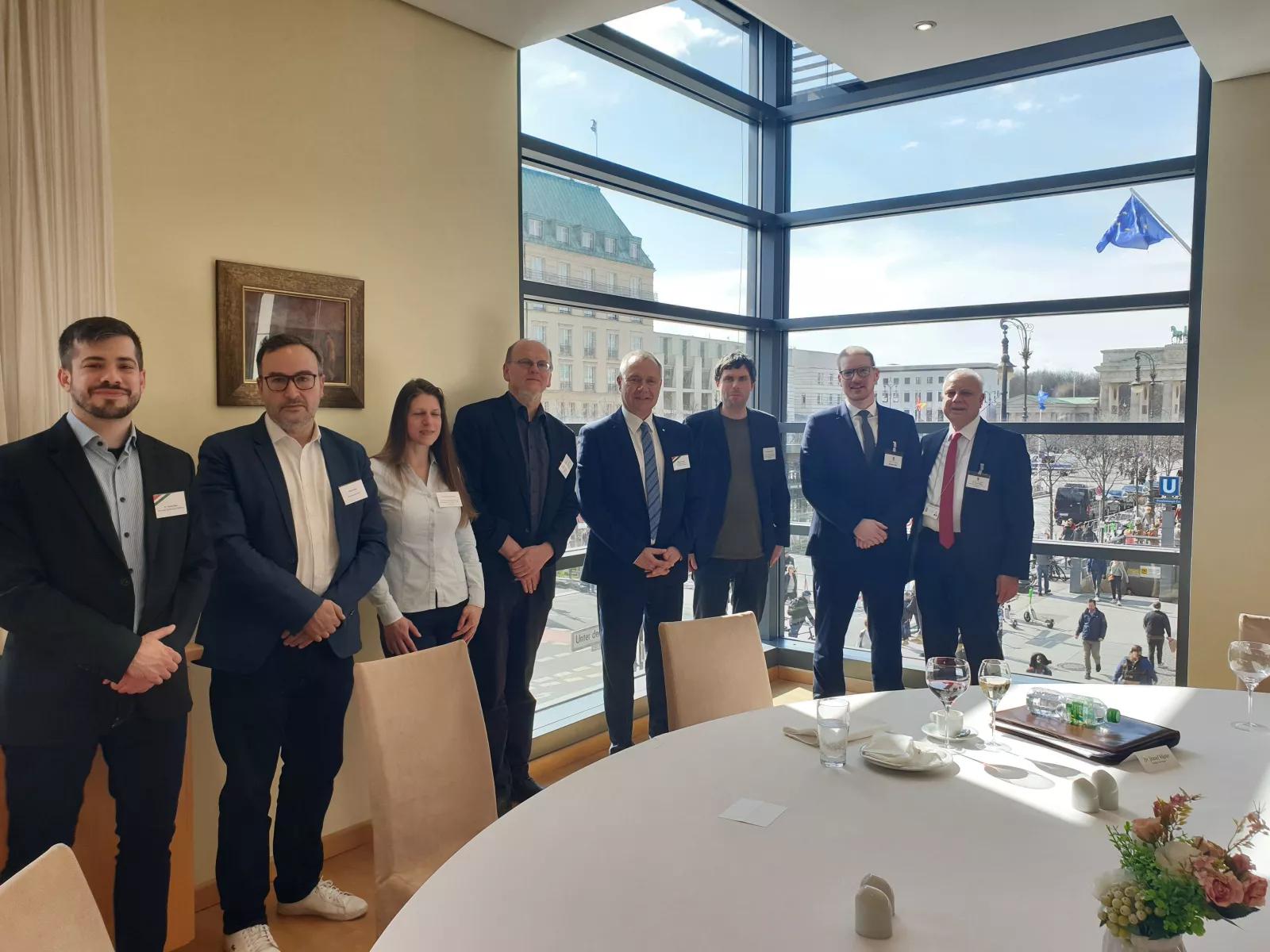
The National Laboratory of Artificial Intelligence (MILAB), led by ELKH SZTAKI, also participated in the event of the Hungarian Embassy in Berlin on 30 March 2023, presenting the Hungarian artificial intelligence ecosystem.
Speakers at the event included László Bódis, Deputy State Secretary for Innovation at the Ministry of Culture and Innovation, Roland Jakab, President of the AI Coalition, László Jobbágy, Digital Champion and Dr. Ferenc Kása, Specialist Diplomat at the Neumann Technology Platform. Gábor Érdi-Krausz, Project Coordinator of MILAB, presented the structure and activities of the National Laboratory for Artificial Intelligence and how they fit into the Hungarian AI ecosystem. The presentations were attended by about forty people on site and two hundred and thirty in the online space. After the presentations, the Hungarian participants had a private lunch with representatives from Hamburg AI (ARIC), KI Forschungszentrum (DFKI), KI Verbund e.V. and AI Kampus.
"The aim is to establish cooperation between research institutes, universities and companies operating in the Hungarian and German ecosystems," László Bódis, Deputy State Secretary for Innovation at the Ministry of Culture and Innovation, told MTI by telephone from the event venue. At the event, Ambassador Péter Györkös gave an introduction and then László Bódis spoke about the potential of the artificial intelligence ecosystem for the Hungarian economy and how it fits into innovation strategies. From the German side, representatives of research institutes, universities, professional and business organisations will participate in the event.
In addition to the National Laboratory for Artificial Intelligence, the Artificial Intelligence Coalition, which brings together more than 400 organisations, was also presented at the meeting. The latter has been created to put Hungary at the forefront of artificial intelligence developments and applications in Europe. Roland Jakab, President of the AI Coalition and Managing Director of Ericsson Hungary, gave an online presentation on the topic.
"There are already collaborations in place, an example being SZTAKI, one of the most successful research institutes of the ELKH, which has active research links with the Fraunhofer Institutes in Germany. The aim would be for organisations operating in Hungary to strengthen links with their German partners in this ecosystem and to set up joint projects," the Deputy State Secretary said.
László Bódis recalled that the AI Coalition was established in 2018, the first structure that brought together the actors of the artificial intelligence ecosystem in Hungary. The AI Coalition's activities led to the government's decision to create the Artificial Intelligence Strategy, which sets out the tasks to be undertaken in the period 2020-2030 to ensure that artificial intelligence contributes to Hungary's economic performance and the well-being of society.
"It's a very massive technology trend, a lot of investment is going into AI, it's fundamentally changing the way most industries work, think ChatGPT for example. Artificial intelligence has a mathematical and network-theoretical basis, and there were and are world-class Hungarian researchers in this field, formerly János Neumann and Pál Erdős, and nowadays László Barabási Albert. We are also strong on the corporate side, and here in Berlin I spoke about the AImotive start-up company, which the Stellantis group has reportedly bought for €300 million," said László Bódis. He added that the state will invest HUF 12 billion in the National Laboratory for Artificial Intelligence and its research between 2020 and 2025; this platform will bring together Hungarian research institutes and the corporate sector and will encourage cooperation.
Cover photo, from left to right: Dr. Ferenc Kása, NEUM Kft.; Daniel Abbou, KI Verbund; Dr. Kinga Schumacher, DFKI; Dr. Lothar Hotz, ARIC; Gábor Érdi-Krausz, MILAB; Matthias Gutschmidt, DFKI; Dávid Velki, Attaché for Foreign Trade and Dr. József Vápár, Attaché for Technical Affairs, Embassy of Hungary in Berlin.